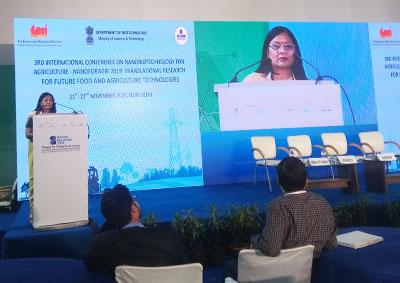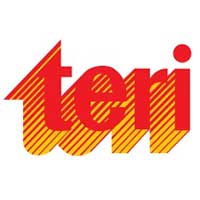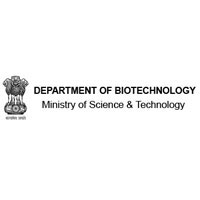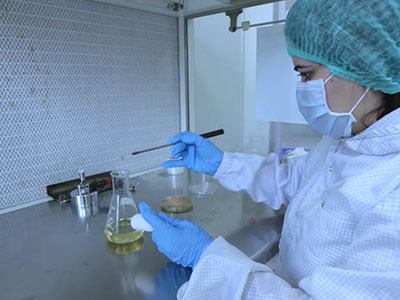Nanobiotechnology research should lead to products and technologies: Dr Suchita Ninawe at Third International Conference on Nanobiotechnology for Agriculture

New Delhi, Nov 21: The TERI-Deakin Nanobiotechnology Centre (TDNBC) and the Department of Biotechnology, Govt. of India, organised the Third International Conference on 'Nanobiotechnology for Agriculture: Translational Research for Future Food and Agriculture Technologies' today. The two-day conference is being held as part of Global Bio-India Summit 2019 in Aerocity, New Delhi.
The conference aims to advance research and product development in food and agriculture nanotechnology and to discuss innovative strategies for enhancement of crop nutrition, nanotechnology in food preservation and shelf life enhancement, and translational research in food and agriculture.
Dr Suchita Ninawe, advisor, Department of Biotechnology, Govt. of India, was present at the conference. She said that the research in nanobiotechnology should lead to products and technologies.
"Nanotechnology for agriculture guidelines have been finalised with the help of TERI and other partners and will be released soon. These guidelines will provide a clearer path on how to move ahead with products," she said.
The conference's first session, on 'Innovative strategies for enhancement of crop nutrition', started with a presentation on stubble burning titled 'Biochar- A Sustainable Solution to Stubble Burning, Soil Fertility, Food Security, and Climate Change Mitigation'. Biochar is charred organic matter, produced by pyrolysis of biomass. The thermal decomposition of organic feedstock is done generally at slow heating rates under no or limited oxygen conditions as opposed to open burning in fields, as is currently done. The fine-grained charcoal gained as a result of this process is called biochar.
Prof. Dinesh Mohan, Jawaharlal Nehru University, who gave the presentation, said, "Biochar, with its porous nature, can be used to clean water, improve soil fertility, and sequester carbon. In October 2018, the IPCC recognised biochar as a carbon sequestration method."
"The deliberations during this conference will help researchers and scientists across various fields with the knowledge to ease them into translational research and accelerated product development," said session chair Dr Alok Adholeya, Senior Director, Sustainable Agriculture, TERI.
Dr Adholeya is also the Director of TDNBC, which was inaugurated in 2017 by Prime Minister Narendra Modi and Australian PM Malcom Turnbull at TERI's Gwal Pahadi campus in Gurugram, Haryana. It was established in collaboration with Deakin University, Australia, as a pioneer research centre in nanobiotechnology in India. It is devoted to developing innovative nanobiotechnology based solutions to address current challenges in agriculture and environment.
"TDNBC has developed nanofertiliser products and technologies that have the potential to emerge as significant disruptive technologies," Dr Adholeya added.
Nanonutrients (Nano phosphorus, nano iron and zinc)
The centre has developed the technology to biologically produce nano zinc, iron, and phosphorus products. The iron and zinc products are produced by recovering these metals from industrial waste through biological processes and are hence low in toxicity.
Further, nanonutrients are required to be applied in few grams per acre as compared to bulk fertilisers that are required in kilogrammes per acre. TERI's nano phosphorus product can reduce the application dose of bulk fertiliser by 50-70%, while zinc and iron nanofertilisers can completely replace the bulk form.
These products have been field tested with positive results such as enhanced seed germination and emergence, biomass growth, flowering, fruit setting, yield and fortification of nutritional quality of produce.
Mycorrhiza
Another notable area where TERI has achieved successful results is mycorrhizal research and bioremediation. Mycorrhiza is a biofertiliser that has the potential to reduce the use of chemical fertilisers globally by nearly 50%. It is a fungal system that forms a symbiotic relationship with plant roots and helps them tap nutrients from soil that would otherwise have been inaccessible to them.
TERI has the world's biggest facility for producing mycorrhizae. It has successfully demonstrated the impact of this product across India (nearly 40,000-50,000 hectares) and parts of North America and Europe. The production technology of mycorrhiza is patented and the product is produced in accredited laboratories.
This technology has also been used in greening industrial wastelands ranging from Mithapur in Gujarat, Vijaywada in Andhra Pradesh, to Dukhan in Qatar. It has worked in remediating conditions such as fly ash ponds, chloralkali sludge dump, phosphogypsum sediments and even hypersaline desert soil.
About TERI
The Energy and Resources Institute (TERI) is an independent, multi-dimensional organisation, with capabilities in research, policy, consultancy and implementation. It has pioneered conversations and action in the energy, environment, climate change, and sustainability space for over four decades.
The institute's research and research-based solutions have had a transformative impact on industry and communities. Headquartered in New Delhi, it has regional centres and campuses in Gurugram, Bengaluru, Guwahati, Mumbai, Panaji, and Nainital, supported by a multidisciplinary team of scientists, sociologists, economists and engineers, and state-of-the-art infrastructure.
For further information, contact:
TERI – Aastha Manocha: aastha.manocha@teri.res.in
Edelman – Rakhi Aurora: rakhi.aurora@edelman.com





